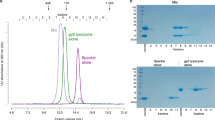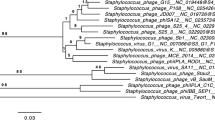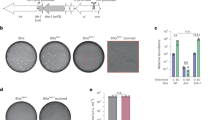Abstract
THE fraction ƒ of bacteriophages remaining active t minutes after having been mixed with antiphage serum may be expressed by the following relation1:  in which D represents the dilution of the serum. The rate constant k, therefore, is a measure of the potency of the serum. Usually, k is determined by diluting the serum and the suspension of virus particles in nutrient broth or buffered saline, in which media a good serum may, at 37° C, show a K-value of 500–1,000 per min. Hence, in order to reduce the fraction of surviving virus particles, ƒ, to less than 1 per cent within an hour, such a serum cannot be diluted by more than 104.
in which D represents the dilution of the serum. The rate constant k, therefore, is a measure of the potency of the serum. Usually, k is determined by diluting the serum and the suspension of virus particles in nutrient broth or buffered saline, in which media a good serum may, at 37° C, show a K-value of 500–1,000 per min. Hence, in order to reduce the fraction of surviving virus particles, ƒ, to less than 1 per cent within an hour, such a serum cannot be diluted by more than 104.
This is a preview of subscription content, access via your institution
Access options
Subscribe to this journal
Receive 51 print issues and online access
$199.00 per year
only $3.90 per issue
Buy this article
- Purchase on Springer Link
- Instant access to full article PDF
Prices may be subject to local taxes which are calculated during checkout
Similar content being viewed by others
References
Hershey, A. D., Kalmanson, G., and Bronfenbrenner, J., J. Immunol., 46, 267 (1943).
Delbrück, M., J. Bact., 50, 2, 137 (1945).
Author information
Authors and Affiliations
Rights and permissions
About this article
Cite this article
JERNE, N. Bacteriophage Inactivation by Antiphage Serum Diluted in Distilled Water. Nature 169, 117–118 (1952). https://doi.org/10.1038/169117b0
Issue Date:
DOI: https://doi.org/10.1038/169117b0
Comments
By submitting a comment you agree to abide by our Terms and Community Guidelines. If you find something abusive or that does not comply with our terms or guidelines please flag it as inappropriate.



